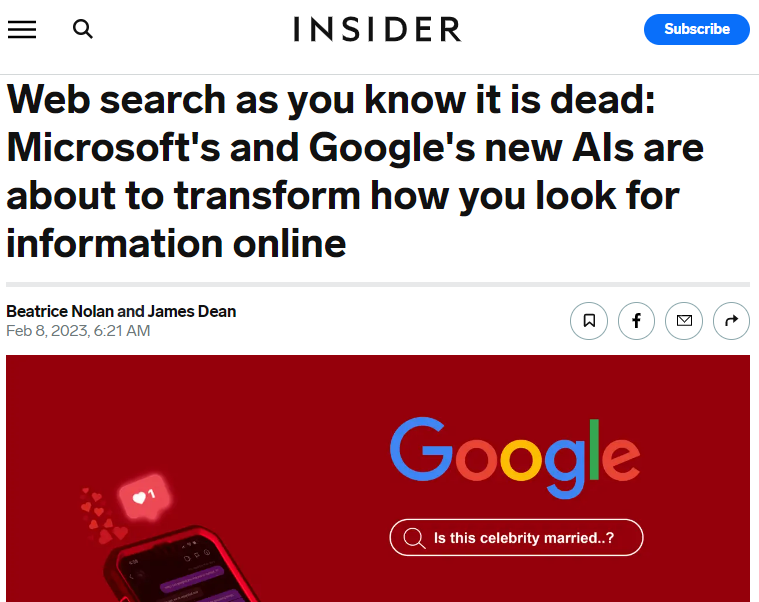Are you tired of hearing about AI yet?
Or are you voraciously consuming everything in sight on the subject?
My wife said I’m “obsessed,” which can’t possibly be true. And I really think things went too far when the whole family got together to do an intervention.
Now, it’s not that I can’t talk about anything else… but a friend asked me a question about AI-powered search, and I thought I’d share the answer with you.
Because a) there was already a lot of chatter about ChatGPT destroying Google… and b) now Microsoft has announced an AI-powered version of Bing that has even more people shook.
Don’t worry, Google won’t be far behind. They announced their ChatGPT competitor, called Bard, this week. But Big G actually demonstrated an AI-infused search at their I/O conference back in 2021!
Anyway… here’s the question I got:
What’s the long-term importance of (written) content marketing now that search engines will give AI-powered synthesized answers to questions with no need to click through to a content publisher’s site?
Good question, right?!
Here’s my response:
Based on my interactions, most of the big dogs are still trying to figure out exactly what the impact of AI-powered search will be.
I don’t know of any publisher or copy guru who’s freaking out, though. (Although some gurus are promoting fear to sell their latest training)
Here’s my take:
1) People still love their people.
The AI-generated “answers” will, by definition, lack personality. Not saying the language won’t be personal-sounding, but it’s not created by a person.
People who love Dave Ramsey, for example, will continue looking to Dave Ramsey for his specific advice on issues.
So even though there will surely be a significant decline in clickthroughs from search inquiries… people will still want to be connected to their favorite experts on topics that intrigue them the most.
2) As smart as AI is, I don’t think the synthesized answers will satisfy anyone looking to really explore a topic. It will be perfect for quick answers, overviews of subjects, etc…
But at some point, deep divers will need to click over to real websites with more comprehensive coverage.
Google has already been prioritizing real expert-level content in search, and it will continue to do so.
Search results will be able to skip over websites that doesn’t offer in-depth content because the AI will be able to handle quick questions itself.
3) Publishers/content creators/entrepreneurs will HAVE to focus more on capturing email addresses.
Because you don’t want your fate completely in the hands of the fast-changing world of search.
Securing email addresses gives you a captive audience that you can push information to.
I see “push content” as a trend that’s been growing anyway.
When TikTok overtook Google as the most popular website on earth, you see that search barely exists.
People are deciding the kind of content they want to consume via engagement over time — and having that type of content pushed to them, via TikTok, email, SMS.
I think this will be an increasingly influential part of content marketing, which has been thought of as more passive up til now.
4) The other thing is that AI, in its current form, can’t be forward looking or truly creative.
As you said in the question, it “synthesizes” what it consumes from human creators.
So in that respect, it’s going to lag behind humans until it figures out how to create something authentically new.
Also, AI can crunch economic and housing market data, for example, and even make predictions about where the market will go in the next 12 months…
But that info won’t be available in search anytime soon. Readers will still have to go to publishers to get trustworthy, contextually accurate insight into future developments.
So publishers/creators who are pushing their industries forward and helping their audience navigate a changing world will also be ahead of AI for the foreseeable future.
(Admittedly, the foreseeable future is probably like 90 days lol)
As you’re creating content, think about how you can push your industry forward and prepare your readers/viewers for what they’re likely to face in their uncertain tomorrows.
As you’re planning out products, a minimum viable product (MVP) may be less appealing. Because people can get so much from search, so much from AI.
You gotta bring the “A game” pretty quickly.
— — —
Hope that’s helpful for you. Go capture some email addresses.
I have to get back to my intervention. Sounds like the family is starting to look for me.
Have a productive day.
Donnie
P.S. I clearly lied to you. I said Inbox X-Factor would be available in January. I missed my deadline. But it’s coming soon.
Thanks for your patience!


